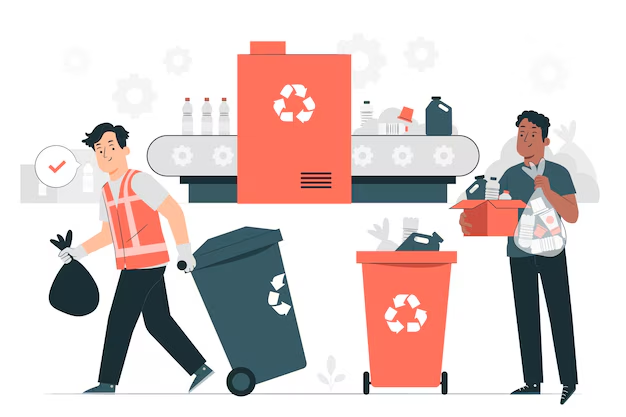Introduction
Hook
The Increasing Need for Sustainable Waste Management Practice
- The world is highly concerned with environmental issues; hence it has become crucial in this century to promote the message that sustainable waste management is the way forward. The rise in urbanization and population growth leads to a mounting volume of waste, thus posing a problem to our ecosystems. There is, therefore a critical need for effective waste management, which is pollution abatement and resource conservation outside mitigating climate change. Sustainable practices in communities offer a clean and healthy environment for future generations. As far back as human civilization can remember, the need for change to more sustainable waste management methods has been of growing urgency- a critical issue now.

How Data-Driven Approaches Are Revolutionizing Waste Management
- Data-driven approaches are changing the face of waste management in their efforts toward precision, efficiency, and innovation. Powered by enabling technologies ranging from IoT, and AI, to big data analytics, modern systems of waste management can optimize routes for collection, predict waste generation patterns, or streamline recycling processes. These improve efficiency and reduce environmental impact while maximizing resources. These are just the kinds of applications of data power that enable municipalities and companies to streamline their operations, make informed decisions, and obtain much more sustainable waste management practices. This revolution opens the way to a more sustainable future through smarter, greener cities.
Section 1: Understanding Data-Driven Waste Management
Definition
What Is Data-Driven Waste Management?
- Data-driven waste management refers to the use of data analytics and technology in optimizing collection, disposal, and recycling activities. With IoT sensors, AI algorithms, and big data analytics, municipal waste management can now track in real-time the required information regarding the generation of waste, the levels of bins, and routes for collection. From here, it looks at making informed decisions about improving operational efficiency and minimizing potential environmental impact. One could say it in the simplest words: data-based waste management turns the traditional system of waste management into a more intelligent, responsive, and sustainable system.
Importance:
Why Data is Important for Current Waste Management
- From this perspective, data takes center stage in contemporary waste management since they can offer more efficient and effective practices, which are sustainable. With good data, scheduling the timetables for waste management collection can be done more efficiently. This would then optimize the use of the available fuel and reduce the cost of operations. Predictive analytics allows for advanced estimates of trends in the creation of waste, thus making resource allocation and planning much more accurate. The low recycling areas are also pointed out, thus focusing proper education campaigns on such communities to improve participation. Through its real-time monitoring, overflows, and illegal dumping are curbed through interventions at the correct time. On average, in the data-driven approaches, smarter waste management tends to cause a lesser impact on the environment and supports sustainability.
Section 2: Key Technologies in Data-Driven Waste Management
IoT: Real-Time Tracking and Monitoring
- An Internet of Things in the data-driven waste management solution can track and monitor in real time. Internet-of-things devices are fitted inside waste bins as well as in collection vehicles. These comprise intelligent sensors and GPS trackers, which collect information perpetually regarding the fill levels of bins, vehicle location, and various collection routes. This real-time data will help the company manage waste by optimizing collection schedules and preventing overflows and excessive unnecessary journeys, thus conserving fuel and reducing emissions. Internet of Things technology effectively and timely collects waste by enhancing the efficiency and sustainability of the system overall.
AI and Machine Learning: Predictive Analytics and Optimization
- Artificial intelligence and machine learning, with their predictive analytics and optimization, revolutionize the approach to waste. Such analysis of historical data can point out a variety of patterns. Applying this analysis, AI algorithms can predict future trends in waste generation, thus optimizing the routes for collection. Moreover, the machine learning models could also potentially improve recycling processes through better segregation of waste. These technologies will allow a waste management system to predict demand, better allocate resources, and lower its operation costs. AI and ML: Predictive Capabilities for Smart Waste Management
Big Data Analytics: Deep Analysis of Data for a Better Decision Process
- Big data analytics is the source through which complete data analysis takes place in waste management. Amounts of data that have been accumulated from sources such as the generation of waste and recyclable wastes are analyzed to give a preliminary insight into the process of waste generation, efficiency in collection, and rates of recycling. This enables waste management companies to have a holistic view of the area, trace performance metrics, and make data-informed decisions. For example, it might be possible to use big data to identify areas with lower levels of participation in recycling, where intervention channels could open up. In waste management, big data analytics can improve operations to make systems more sustainable and yield better environmental outcomes.
Section 3: Benefits of Data-Driven Waste Management
Efficiency: Rerouting and Scheduling Collection
- For example, a waste management system could determine where collection vehicle routes might be optimized by leveraging the real-time data from IoT sensors and GPS tracking for better time and fuel use as well as reduced carbon footprint for the operations of collection. In sharp contrast, dynamic scheduling only empties bins when they are full and will not overfill or require as frequent collections. Apart from being operationally efficient, optimization improves service reliability and customer satisfaction.
Sustainability: Waste Sent to Landfills Decrease and Recycling Rates Increase
- Data-driven practices also significantly contribute towards sustainability through their application in reducing the volumes that are destined for landfills and increasing the recycling rates. The readily available detailed data would also make the waste management systems realize the patterns of generation and recycling of waste. All this information could thus be used in targeted educational campaigns and incentives in the pursuit of promoting recycling. Better sophistication and accuracy in recycling processes will also be able to be achieved using advanced sorting technologies powered by AI. The diversion of more waste from landfills or improving recycling efforts can support a data-driven approach for a more sustainable and circular economy.
Cost Benefits: Improve Operations Expenses through Better Resource Planning
- High benefits of cost savings from deploying data-driven waste management practices relate to improved resource planning. Improved routes and scheduling reduce fuel consumption and mileage of the vehicles, which in turn reduces maintenance and other operational aspects’ costs. The service operations may be forecasted to ensure effective resources and personnel allocation to different tasks. Sometimes, improved recycling will generate some revenue. Data-driven approaches, in general, enable waste management companies to offer qualitative services at a relatively cheaper cost and, therefore more conducive to sustainability.
Section 4: Future Trends
Integration of Waste Management into Smart City Initiatives
- In the smart city initiatives, waste management becomes part of other city infrastructure through advanced technologies. The advancement uses IoT sensors, smart bins, and connected vehicles, through which the sensors get real-time data about the levels of waste and efficiency of collection, which then sends it to central systems that coordinate waste collection with other city services, like traffic management, and energy distribution. Integrating waste management into smart city initiatives can optimize the use of available resources, reduce operational costs, and enhance the overall quality of urban life. This holistic approach ensures that waste management is not an isolated function but a key component of a sustainable and efficient urban ecosystem.
Advanced Robotics: Automation in Waste Sorting and Processing
- State-of-the-art robotics is transforming waste sorting and processing, as more tasks are now automated, which were at one time based on labor and human error. The devices fitted with robots can identify many types of waste and sort materials into their categories at high speeds, with the assistance of AI and machine learning capabilities. This contributes to improved efficiency and accuracy in recycling operations and also helps reduce contamination and valuable materials recovery. Moreover, robotics may process hazardous waste more safely compared to human workers, so there might be less health risk. Apart from increasing operational efficiency in the management of waste, the use of sophisticated robotics in waste management results in higher recycling rates and better resource use.
Circular Economy: Role of Data in the Promotion of Circular Economy
- Data is instrumental in ensuring a circular economy because it allows for better resource use and enhances efficiency in waste reduction. Data analysis at detailed levels is therefore key, and through it waste management systems keep tabs on materials through the whole process from production to disposal. Such information can, therefore be useful in tracking the utilization of raw materials, which may pose opportunities for reuse or recycling and recovery with reduced waste and improved resource efficiency. This will, therefore contribute to knowledge through data-driven insights that form the basis of product and process designs more intrinsically sustainable and easier to recycle. Using this information, businesses and cities can step out of a linear “take-make-dispose” pattern into a more circular economy where materials are endlessly reused – for less environmental impact but also greater economic resilience.
Conclusion
Summary:
Efficiency, Sustainability, and Cost-Effectiveness of Data-Driven Waste Management Benefits and Future Potential
- Waste management through data-driven approaches includes efficiency, sustainability, and cost-effectiveness. The adaptation of IoT, AI, and big data analytics, can optimize the collection route in waste management systems, predict trends in the waste generation profile, and improve recycling processes. The bottom line is preserved, and environmental impacts are reduced through costs of operation and utilization of resources. This will be more beneficial if it would somehow be integrated with the smart city initiative coupled with advanced robotics applications. Data-based approaches will be decisive in the future creation of smarter and greener cities as well as providing grounds for circular economies.
Call to Action: Calling Stakeholders to Implement Data-Driven Approaches
- All this requires that the multiple stakeholders-including municipalities, waste management companies, and citizens willing to adopt innovative and new data-driven approaches of waste management for its full realization of potentiality. The municipalities need investment in the infrastructure and technologies, while the companies managing waste need to avail themselves of analytics in the data to optimize their working. The citizens can make a difference by participating in recycling programs and promoting sustainable practices. Together, let’s build a wiser, more efficient, sustainable, and resilient waste management system. Together, today is the time to unleash the power of data to create a clean and healthy future for all.
